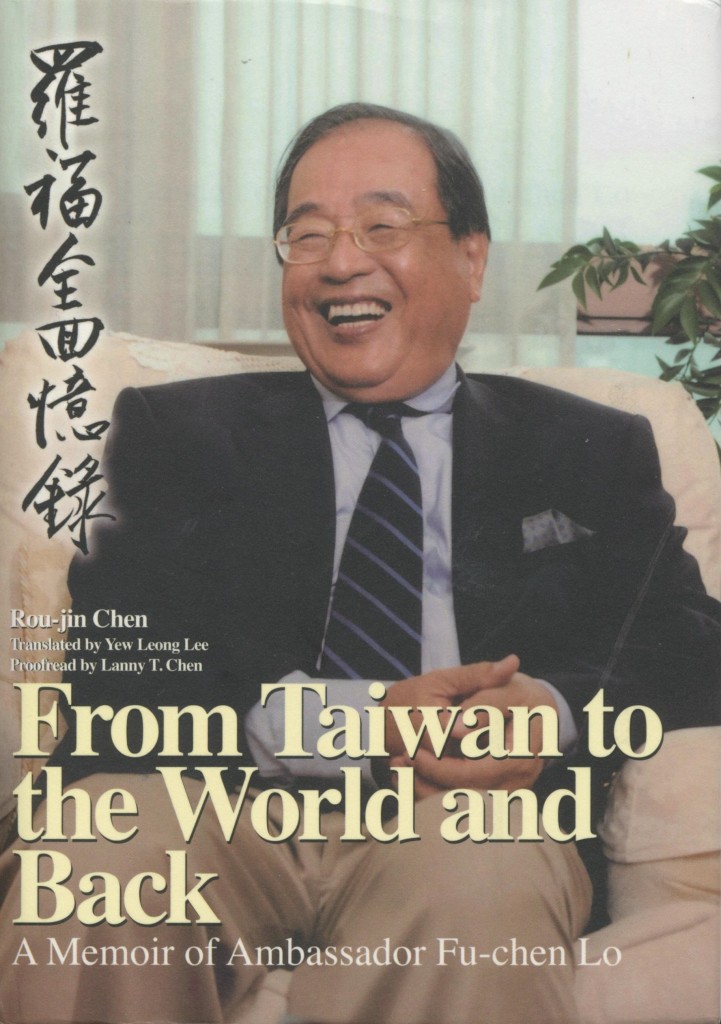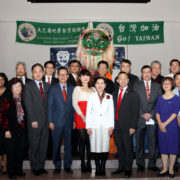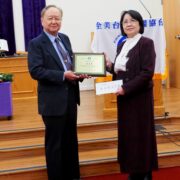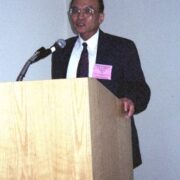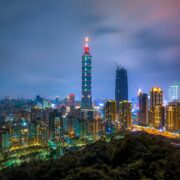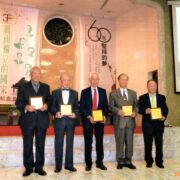From Taiwan to the World and Back: 羅福全回憶錄
作者 陳柔縉
I am a Taiwanese through and through. I left Taiwan shortly after completing my university studies, not expecting to stay abroad for 45 years before coming home for good.
My initial reason for leaving the country was to evade the oppressive atmosphere of Taiwan under martial law. I went to the United States to study at the University of Pennsylvania in the 1960s. Then, determined to be a free man, I gave up my R.O.C. passport, thereby crossing the point of no return. The founder of the University of Pennsylvania, Benjamin Franklin, was also one of the co-signers of the United States Declaration of Independence. Although people from the United States and England share a same language and racial background, Americans nevertheless wanted to establish their own sovereignty as a country; this was their God- given right. When the United States was declared independent, the first modern nation state was born. Living in exile in the 1960s at that time, Chin-fun and I drew comfort from this Declaration. This time was also the beginning of a new life for me.
In the 1970s, after I presented a paper at the World Geographical Unions annual conference, an official from the United Nations approached me asking me if I would be willing to work for the UN Center for Regional Development (UNCRD) that they had recently set up in Japan. This would be another turning point in my life. I would spend cumulatively 25 years in Japan over the course of my life. The time spent in both pre-war and post-war Japan led me to developing quite a deep personal history with the country. As a young child, I had lived in Japan for five years before the War, and three years as a graduate student for my Masters degree. From 1990 to 2000, I spent another ten years in Tokyo working for the United Nations University, which was followed by four years from 2000 to 2004 as Taiwan’s top representative to Japan, I helped to foster bilateral relations between Taiwan and Japan — a most meaningful opportunity of a lifetime.
In the 1970s when I first started my work at the United Nations, East Asian countries one after another entered a period of high economic growth. Japan was first, followed by the four East Asian “dragons”: Taiwan, Korea, Hong Kong, and Singapore. The 1990s saw the rise of China and, with it, the Southeastern Asian countries. In the past decade, India’s economy has also begun to soar. As economic development advisor to these countries, I experienced a firsthand account, of this boom that has been hailed as the “East Asia Miracle” by the World Bank.
It wasn’t only an economic shift that these countries experienced but also a deeply societal one; every country inexorably entered the era of modernization. It was a great blessing for me to have witnessed and contributed to it all firsthand. Such historical events include the assassination of South Korean President Park Chung-hee in the 1980s followed by the Gwangju Uprising; the People Power Revolution in 1986 that overturned the Marcos government in the Philippines; the democratization of Indonesia sparked by the transition from pro-Communist Sukarno to pro-US Suharto. I’ve also seen the chaos before the collapse of Iran’s monarchy in 1978; and the change in Pakistan’s government. In November of 1980, I visited Beijing for the first time and saw how China put the Gang of Four on trial. On the first anniversary of the Tiananmen Square incident, I happened to be giving a lecture at Peking University, so I had the opportunity to talk with the students while their university’s main gate was blockaded by soldiers from the People’s Liberation Army. When the Cold War ended, I personally witnessed the upheaval that each Eastern European country went through. I saw how my friends, my students, as well as the general public faced up to the change. All these historical moments contributed to my precious life experience.
During the ten years from 1990 to 2000 that I spent at the United Nations University, the United Nations held its first ever Earth Summit in Rio de Janerio, Brazil. This UN summit announced that the new challenge facing mankind was Earth’s sustainable development — this would become one of my core research subjects at the university. My other main research topic was a problem faced by the world’s “mega cities,” i.e. the problem of a great influx of rural populations into these large cities, partly due to the population explosion in third world countries. On the other hand, due to the maturation of an international economic integration that saw the formation of “world cities” and network of cities controlling major internationalized economies. For both these research topics, I collaborated with scholars and organizations from both developed and developing countries; as such, I traveled all over the world.
For a time, I felt great regret that I could not be by Chin-fun’s side as she raised our children in the United States, thousands of miles away. This was the period that Tse-hsin (Ted) and Tse-yen (David) were attending high school and university which is, without a doubt, a period of adolescence where one is most impressionable and when one is most in need of his father’s guidance and the warmth of family life. At the end of 1984, after I decided to go back to Asia, I received an offer for a full-time professorship from the University of Pennsylvania’s Regional Science Department. Even so, my heart was still pointing me towards helping developing countries, so I flew across the ocean alone to pursue my calling.
Long-distance calls each weekend and postcards from Paris and Argentina cannot make up for my being an absent father to my children. Fortunately for me, Chin-fun was and is a strong woman, who ably took up her wifely duties of looking after the household and the children in my absence.
My children finished their studies smoothly and found jobs in American companies. One after the other, they were sent to Tokyo for work. During my time at the United Nations University and my four years as Taiwan’s top representative to Japan, our family was finally reunited in Tokyo. It was also during this time that my children both got married and our family of four grew to six. Our family gatherings then were the happiest moments of our lives. Ten years later, my grandchildren are now using many different languages to talk to us. After leaving Taiwanese soil for over forty years, my family has become an international one.
In the summer of 2004, I finally came back to Taiwan to stay for good. From my tenth-story apartment, I have a grand view of Tatun Mountain, Yangming Mountain, as well as the undulating peaks of many mountains. The sunset view is especially touching. Protesters bearing blue or green colors represent KMT or opposite parties fill the streets down below from time to time. Evidently, modern society, like the society I grew up with, is still inherently unjust. Nevertheless as a democracy, Taiwan has made leaps and bounds. The era of military rule is over, replaced by that of a new democracy. Like many other Asian countries, Taiwan is now well on its way to becoming a true modern democracy.
Over the last twenty years, the economic growth of China, just across the Taiwan Strait from us, has been a cause for joy. To think that the May Fourth Movement of students in Peking back in 1919 had proclaimed that science and democracy could save China. Today, only Science has prevailed. The Chinese still have quite a long way to go as far as democracy is concerned. Compared to China, Taiwan is truly fortunate in this respect. The Taiwan that I’ve returned to after forty years of being abroad is a brand-new Taiwan.
Chin-fun loves the opening of Martin Luther King’s “I Have a Dream” speech. The word “dream” can also be interpreted as an ideal, the road striving towards that ideal, a road sign. This book represents that road we’ve walked together, but it’s also a record of our everyday lives.
I’m very grateful to Chen Rou-jin for her professionalism and her dedication in completing this book. For their attentiveness, I want to thank my editors at Commonwealth Publishing, Hsu Yao-yun, Chou Su-yun and Lu Yi-sui. Finally, I’m grateful to Asymptote’s editor-in-chief Lee Yew-leong for translating this book into English.
Lo Fu-chen 1 July, 2013
Author
Rou-jin Chen
Rou-jin Chen was a journalist, who is now a columnist. She specializes in historic writing, and is the author of many best-selling books. She has won the Good Book Award from China Times, Best Ten Non-fiction Award from United Daily News, and Golden Tripod Awards for Publications twice from the Ministry of Culture of Taiwan.
Translator
Yew Leong Lee
Lee Yew Leong is the founding editor of Asymptote. He is the author of three hypertexts, one of which won the James Assatly Memorial Prize for Fiction (Brown University). He has written for The New York Times and DIAGRAM among other publications.
Proofreader
Lanny T. Chen
Once a columnist and editor of Taiwan Tribune, Lanny T. Chen now concentrates on book translation. Her works include the Chinese version of Moll Flanders (by Daniel Defoe), Alma Mahler or the Art of Being Loved (by Francoise Giroud), Forbidden Nation – A History of Taiwan (by Jonathan Manthrope), Formosa Betrayed (by George Kerr) etc.
635 From Taiwan to the World
Posted in 2015/06

